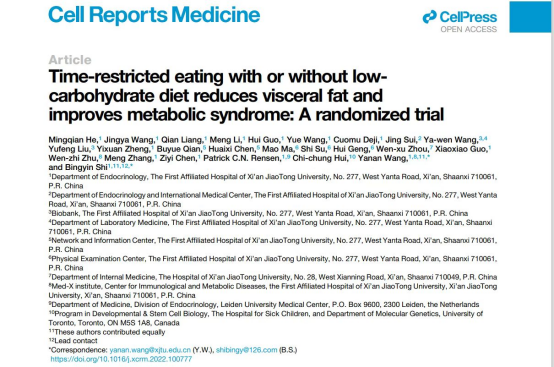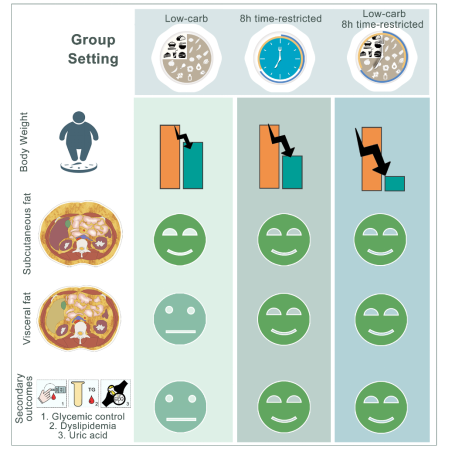Diabetes mellitus and metabolic syndrome are closely associated with lifestyle. However, high-level studies of the interventions through lifestyle changes are lacking. On October 10, 2022, Professor Shi Bingyin's team published significant research results in the field of diabetes and metabolic syndrome as an online Article entitled Time-restricted eating with or without low carbohydrate diet reduces abdominal visceral fat and improves metabolic syndrome: a randomized trial in Cell Reports Medicine, a journal belonging to Cell. This article is the original research of the First Affiliated Hospital of Xi 'an Jiaotong University (XJTU). Doctoral student He Mingqian is the first author. Professor Shi Bingyin from Department of Endocrinology and Professor Wang Yanan from Institute of Immunology and Metabolism of Med-X Research Institute are co-corresponding authors.

The team is the first to conduct clinical trial worldwide to directly compare the effects of low-carbon diet, 8h time-restricted eating and these two combined upon the weight and metabolic indexes of patients with metabolic syndrome in Shaanxi province, China. In this study, 169 adult patients with metabolic syndrome were randomly divided into three groups at a ratio of 1:1:1, including low-carbon diet group (carbohydrate<130 g/d or <26% of total energy), 8h time-restricted eating group (self-selection of early or late 8h eating window) and the combination of these two. Smart Hospital platform and self-designed intelligent wearable diagnosis and treatment devices were utilized to deliver 3-month real-time monitoring for diet, exercise and health, remote dietary guidance and follow-up for all participants, aiming to compare the effects of low-carbon diet, time-restricted eating and the combination on the weight, abdominal fat and other metabolic indexes in metabolic syndrome patients.

The findings in this study suggest that three dietary intervention regimens can significantly reduce body weight, subcutaneous fat and fasting level of insulin. Compared with low-carbon diet, time-restricted eating brings more benefits to abdominal and visceral fat area and metabolic indexes, such as blood glucose level, uric acid level, blood lipid level and blood pressure, and patients with metabolic syndrome have better compliance with time-restricted eating. These two combined exert more evident effect upon weight loss and metabolic syndrome. This study shows that a more appropriate diet intervention regimen can be selected according to the type and degree of fat accumulation in different types of obesity. For subcutaneous fat obesity, low-carbon diet and time-restricted eating can exert significant effects. However, time-restricted eating can exert better effect on visceral fat obesity compared with low-carbon diet. The combination of these two can yield higher efficacy. The findings in the present study prove that simple lifestyle interventions can effectively improve the weight and relevant metabolic indexes of patients with metabolic syndrome. In the future, the promotion and application of these interventions will significantly affect the prevention and treatment of these types of diseases.
This study is supported by National Science and Technology Major Project of the Ministry of Science and Technology of China. Professor Chi-chung Hui from University of Toronto and Professor Patrick C.N. Rensen from Leiden University in the Netherlands provide assistance and guidance for this study.